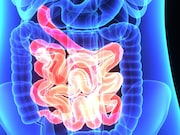Men with two or more servings of yogurt per week have reduced risk for conventional adenoma
WEDNESDAY, June 19, 2019 (HealthDay News) — Yogurt consumption is associated with a reduced risk for colorectal adenomas in men, according to a research letter published online June 18 in Gut.
Xiaobin Zheng, M.D., from the Washington University School of Medicine in St. Louis, and colleagues examined the correlation between yogurt intake and conventional adenomas and serrated lesions among 32,606 men in the Health Professionals Follow-up Study and 55,743 women in the Nurses’ Health Study who underwent lower endoscopy during 1986 to 2012.
The researchers identified 5,811 adenomas in men and 8,116 in women. Compared with men without yogurt consumption, those who had at least two servings per week had a reduced risk for conventional adenomas (odds ratio [OR], 0.81; 95 percent confidence interval [CI], 0.71 to 0.94; Ptrend = 0.01). For adenomas with high malignant potential, this inverse association was more pronounced (OR, 0.74; 95 percent CI, 0.59 to 0.92; Ptrend = 0.01). Stronger inverse associations were seen for colon (OR, 0.82; 95 percent CI, 0.70 to 0.95; Ptrend = 0.01) versus rectal adenomas (Ptrend = 0.95). No apparent trend was seen in men for serrated lesions, but there was a trend toward an inverse association for lesions ≥1 cm (OR, 0.48, 95 percent CI, 0.25 to 0.95; Ptrend = 0.04). In women, there were no associations for conventional adenomas and/or serrated lesions or according to adenoma subtype or anatomical site.
“Yogurt may also reduce adenoma risk by exerting anti-inflammatory effects on colon mucosa and ameliorating gut barrier dysfunction,” the authors write.
One author disclosed financial ties to the biopharmaceutical industry.
Copyright © 2019 HealthDay. All rights reserved.








